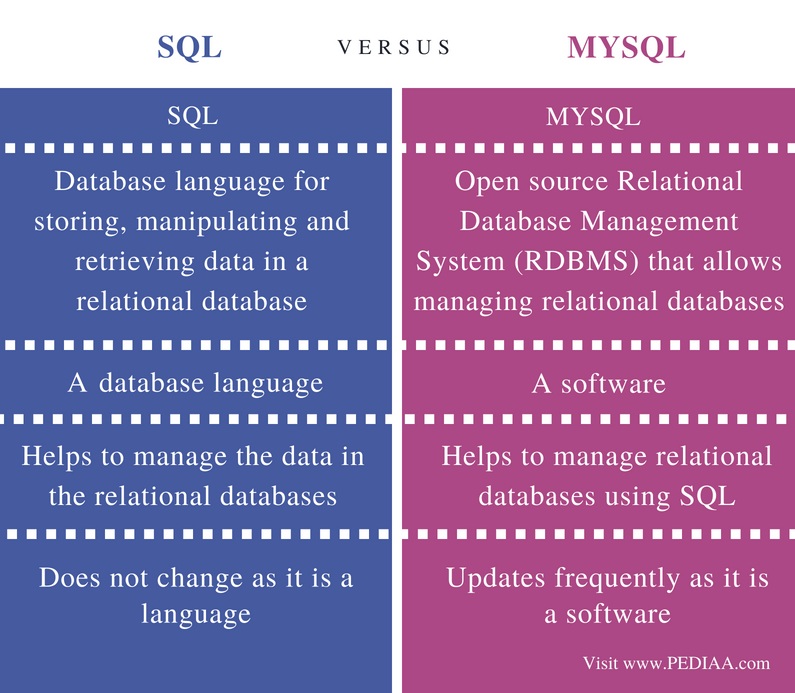When it comes to managing databases, two terms often arise: SQL and MySQL. While they are frequently mentioned together, they serve different purposes in the realm of data management. SQL, or Structured Query Language, is a standard programming language used to communicate with databases. On the other hand, MySQL is an open-source database management system that uses SQL for querying and managing data. Understanding the distinction between SQL and MySQL is crucial for both aspiring developers and seasoned professionals in the tech field.
Database management is a vital component of modern technology, influencing everything from web applications to enterprise-level solutions. SQL serves as the backbone of relational databases, providing the syntax for querying and manipulating data. MySQL builds on this foundation, offering a robust platform for users to implement SQL commands and manage their databases efficiently. This relationship raises important questions about how best to utilize these tools and what differentiates them from one another.
In this comprehensive exploration, we will delve into the essential differences between SQL and MySQL, providing insights into their functionalities, advantages, and limitations. By the end of this article, readers will have a clearer understanding of SQL vs MySQL and be better equipped to make informed decisions regarding their database management needs.
What Is SQL?
SQL, short for Structured Query Language, is a standardized programming language designed for managing and manipulating relational databases. It was first introduced in the 1970s and has since become the industry standard for database management. SQL allows users to perform various operations, including:
- Querying data
- Inserting new records
- Updating existing data
- Deleting records
- Creating and modifying database schema
What Is MySQL?
MySQL, on the other hand, is a popular open-source relational database management system (RDBMS) that utilizes SQL as its query language. Developed in the mid-1990s, MySQL has gained widespread popularity due to its performance, reliability, and ease of use. It is commonly used for web applications and is a crucial component of the LAMP stack (Linux, Apache, MySQL, PHP/Python/Perl).
MySQL supports various features, including:
- Multi-user access
- Replication and clustering
- Transaction support
- Stored procedures and triggers
How Do SQL and MySQL Work Together?
SQL and MySQL work hand in hand in the realm of database management. SQL serves as the language that allows users to communicate with MySQL, providing the commands necessary to perform various operations on the database. In other words, while SQL is the language, MySQL is the platform where that language is utilized.
What Are the Key Differences Between SQL and MySQL?
Understanding the key differences between SQL and MySQL is essential for developers and database administrators. Here are some of the most significant distinctions:
- Nature: SQL is a query language, while MySQL is a database management system.
- Use Cases: SQL can be used with various database systems (such as PostgreSQL, Oracle, and SQL Server), whereas MySQL is a specific implementation of an RDBMS.
- Performance: MySQL is known for its speed and efficiency in handling large datasets.
- Licensing: SQL is an open standard, while MySQL is open-source but also has commercial licensing options.
Can You Use SQL Without MySQL?
Yes, you can use SQL without MySQL. SQL is a language that can be utilized with a variety of database management systems, including PostgreSQL, Microsoft SQL Server, and Oracle Database. Each of these systems has its own implementation of SQL, which may include additional features or variations in syntax.
Do You Need to Know SQL to Use MySQL?
While it is not strictly necessary to know SQL to use MySQL, having a solid understanding of SQL is highly beneficial. Knowing SQL allows users to effectively query and manipulate data within MySQL databases. Without SQL knowledge, users may struggle to take full advantage of MySQL's capabilities.
What Are the Advantages of Using MySQL?
MySQL offers several advantages that make it a popular choice among developers and businesses:
- Open Source: MySQL is free to use and has a large community that contributes to its development.
- Scalability: MySQL can handle large databases and high-traffic applications effectively.
- Robust Security: MySQL provides multiple security layers to protect data.
- Cross-Platform Compatibility: MySQL can run on various operating systems, such as Windows, Linux, and macOS.
What Are the Potential Limitations of MySQL?
Despite its advantages, MySQL does have some limitations that users should consider:
- Limited Support for Advanced Features: Some advanced features found in other RDBMS, like certain types of joins and indexing options, may not be as robust in MySQL.
- Concurrency Issues: In high-traffic situations, MySQL may experience performance bottlenecks.
- Data Integrity: While MySQL provides basic data integrity features, it may lack some of the comprehensive options found in other systems.
Conclusion: SQL vs MySQL – Which Should You Choose?
In conclusion, SQL and MySQL are two integral components of modern database management, each serving a unique purpose. SQL is the language used for querying and manipulating data, while MySQL is the platform that implements this language for database management. Understanding the differences between SQL vs MySQL is essential for anyone looking to work with databases, whether for personal projects or professional applications. Ultimately, the choice between SQL and MySQL will depend on your specific needs, the complexity of your projects, and your familiarity with database management systems.
You Might Also Like
Discovering The Allure Of The Poster Wanted SanjiDiscovering The Best Men's Jacket: A Style Essential
Unlocking The Flavor: The Ultimate Guide To Chicken Soup Seasoning
Exploring The Enigmatic World Of Akela Jungle Book
Unveiling The Enchantment Of Mahabharat Serial Casting
Article Recommendations
- Cast Of Oppenheimer
- Erwin Bach
- Jay Z On Beyonce
- Elaine Andriejanssen
- Dark Jokes
- Sabrina Carpenter Height In Cm
- Eddie Levert
- Tom Hughes Partner
- Bradley Rose Age
- Noel Fielding Relationships


